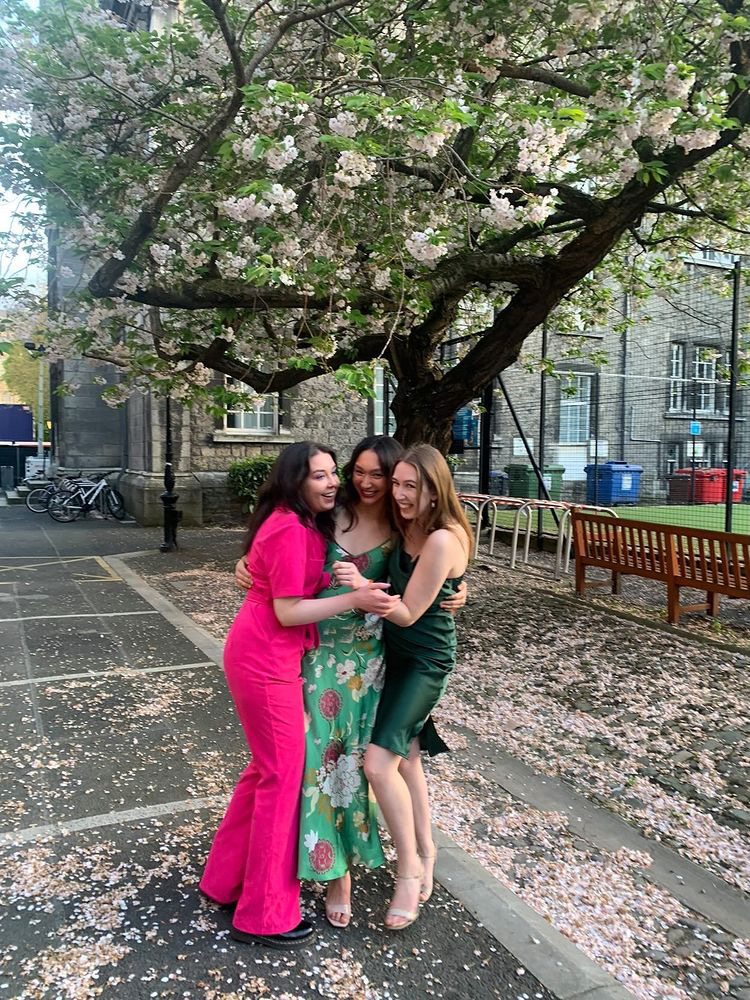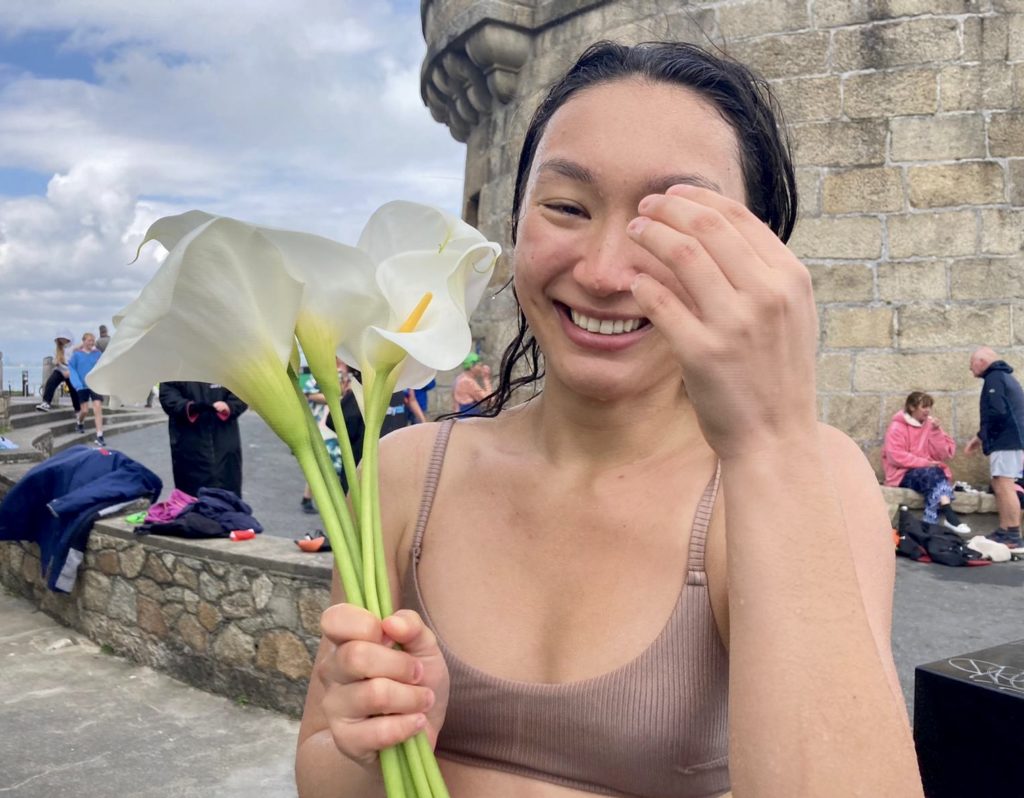
These are some things I know now: How to time my weekly grocery trips to fit within the thirty-six-minute laundry cycle I do every Sunday. How often and where the DART runs, and which swim spots along its Southern route are best at high tide and which are best at low tide. Where the LUAS Green and Red lines go, how to get to Heuston and Connolly most reliably, and the way all Ianród Eireann routes radiate out from Dublin. I know where the cars are going to come from at each intersection (the opposite direction as in America), well enough to jaywalk with confidence.
I know a lot more Irish slang now. On the DART the other day, I overheard a girl say to her friend, “Did your one give out to ya?” and I knew what that meant. I know the different musicalities of the Irish accent, and can tell a Cork accent from a Carlow accent from a Belfast accent from a Clare accent. I even know certain Irish radio hosts’ and TV reporters’ names from repeatedly playing Thirty Seconds with my Irish friends.
I know about Irish crises and bubbles and booms and rushes. I know about the Celtic Tiger and the 2008 recession, and that when Irish people talk about those things, they’re talking about memories of their schoolmates suddenly moving abroad to Bahrain or Dubai for their parents’ jobs. I know what different primary schools mean in a Trinity context and about how here, intelligence and appearing intelligent are used as currencies. I understand the European grading scale now. I get what a BNOC is. I think I know how this place works.
But (and this continues the theme of my most recent blog post) the best and most important things I know now, after having spent nine months in Ireland, are these: How to make it through the winter in a shared kitchen, one late night at a time. How to estimate the number of berries and pain au chocolats one should buy for brunch for four girls after a night spent dancing. How to make an adventure out of helping your friend move home, all her things packed in suitcases and carted onto the bus, laughing over rivers and past estates, heading north. All of these things I learned here at Trinity.
All the endings lately, the graduations, the moving out: it’s so wonderful that life is forging onward. And there will be so many people to visit next year, in their master’s programs abroad in which they’ve so brilliantly earned spots or their new jobs in countries they’ve never been to before. For me and my best friends here in Dublin, April and May were crazy months. We got final coffees with people leaving early. We stayed up all night in the GMB. We swam in the lake at Glendalough. We went to house parties and out for many drinks. We swam at Balscadden. We took a trip to Ellen’s hometown in Laois to watch the Eurovision.
Ellen and I moved into our new home in Goldsmith Hall. Ellen, as a Scholar, was supposed to move to Goldsmith no matter what, but I had the choice to stay in the GMB, where I was. Of course, I chose to go with her. I couldn’t be in the building anymore without the same people there. Now, my new room is full of things people heading home left behind for me to use, IKEA lamps and pretty vases they couldn’t keep, and an air mattress for Rachel and Katherine and anyone else to sleep on whenever they like. All the cups and pots and utensils are in new drawers. I’m a bit slower making breakfast each morning than I was before because I forget where we put them all. I’m re-learning how to be, I joke to Ellen.
When I’m not cooking or writing or doing jiu jitsu or attempting to build routine, I’m going out with the friends who are still here. There’s this quote that has stayed with me from an essay I read in 2015 by the author Ada Calhoun. Writing in The New York Times, she said, “As a teenage girl in the 1990s East Village, every door was open to me and my friends. There was no party we could not crash, no person we could not make out with, and no intoxicant we would not be offered. The city was ours.” That’s maybe a bit hyperbolic to describe the way Ellen, Rachel, Katherine, and I are feeling each weekend now, but the sentiment is the same. “I remember what it felt like getting ready to make something exciting happen, to feel a sense of the city and time radiating out in all directions, like the spokes of a wheel, with me and that night at the center,” Calhoun wrote. Yes. Everything is at our fingertips. We are lately wanting to be menaces, to get up to no good. Daylight in Dublin lately stretches until 11 p.m. Love, or at least good craic as they say, feels easy to come by.

“I don’t know what it is, but every time I walk across Front Square with you guys, I feel like I’m living in the Rooney-verse,” Katherine said the other day, referring to Trinity’s most recent famous alum’s work. I agree with her. And it’s not just Front Square when I get that feeling. When I walk across the Sky Bridge from Goldsmith onto campus at sunset, and the clouds are pink over Pearse Station, I feel like that. Meeting friends for lunch in the sun, I feel like that. At The George the other night, when seabirds flew by and their white bellies were lit up by the club’s red light, I felt like that.
The other day at the Rugby Pitch, Ellen and I were watching cricket, without a clue as to what the rules of the game were. A pair of magpies, their wings painted like kites, landed nearby. “Oh good,” Ellen said, “two for joy.” I learned another Irish phrase then. “One for sorrow,” – and you’re supposed to salute any singular magpie you see, apparently – “two for joy, three for a girl, four for a boy …” And sticky sweet as it is to say it, at that moment, we did indeed have so much joy.
Ellen and Katherine and I were recently discussing whether or not “Trinity” is a genre of books. Certainly, all Rooney books fit in that genre. So does Exciting Times by another recent Trinity grad, Naoise Dolan. I would say the features of ‘modern Trinity’ as a genre include criticizing but also ultimately venerating the university as an institution, and Irish ingenues who bear a unique, weary sadness despite their youth. But most of all, the hypothetical genre would be about romanticizing the lives of young people in Dublin.
I am a young person in Dublin. And, like many writers, I am extremely given to romanticizing. But here is the thing: Dublin is a very romantic city. There are Georgian brick buildings with doors topped with frosted glass fans. And lately, I find myself to be very in love with my life. There’s a sentence in Normal People which describes Connell and Marianne at the end of their relationship after they’ve grown with and through each other. “He brought her goodness like a gift and now it belongs to her. Meanwhile, his life opens out before him in all directions at once.”
Sally Rooney, for all the valid critiques, I think, gets this feeling very right. I do feel like my friends here – Ellen, Rachel, Katherine, Ben, so many others – brought me goodness like a gift, for a very long, sustained period of time. One day last winter I think I just looked up and saw my life and I was happy, and then I turned around and campus was covered in daffodils, and I lived in a flat where I was all but guaranteed to laugh at least once per day if not much more. And now we have the summer, and it feels so earned after the winter, and I’m still happy, and it doesn’t feel breakable at all. With real sweetness and sincerity, there’s no other place I’d rather be.
In a bit, it will be September, and then all my friends’ lives will spread out before them in all directions at once. Mine too. It will be so good. But I’ll have to say goodbye, and it never gets easier, any place I leave. I’m already scared, which, when you think about, it is such a lucky thing.
To keep my mind busy, I made a map of all the places in Dublin that made up the fabric of my life here. Maybe future Mitchells would like to look at it to get some ideas for where to get good coffee or even just where to buy their groceries:
I also made a list of ten things I wish I’d known/did at the beginning of this year, with ten things for Mitchells in general and ten for Trinity Mitchells, specifically. I’ve attached it as a PDF:
But if future Mitchells don’t look at it, that’s more than okay. It’s advice I probably wouldn’t have taken anyways if it had been given to me. Half the fun is figuring out how to be on your own, of course.
